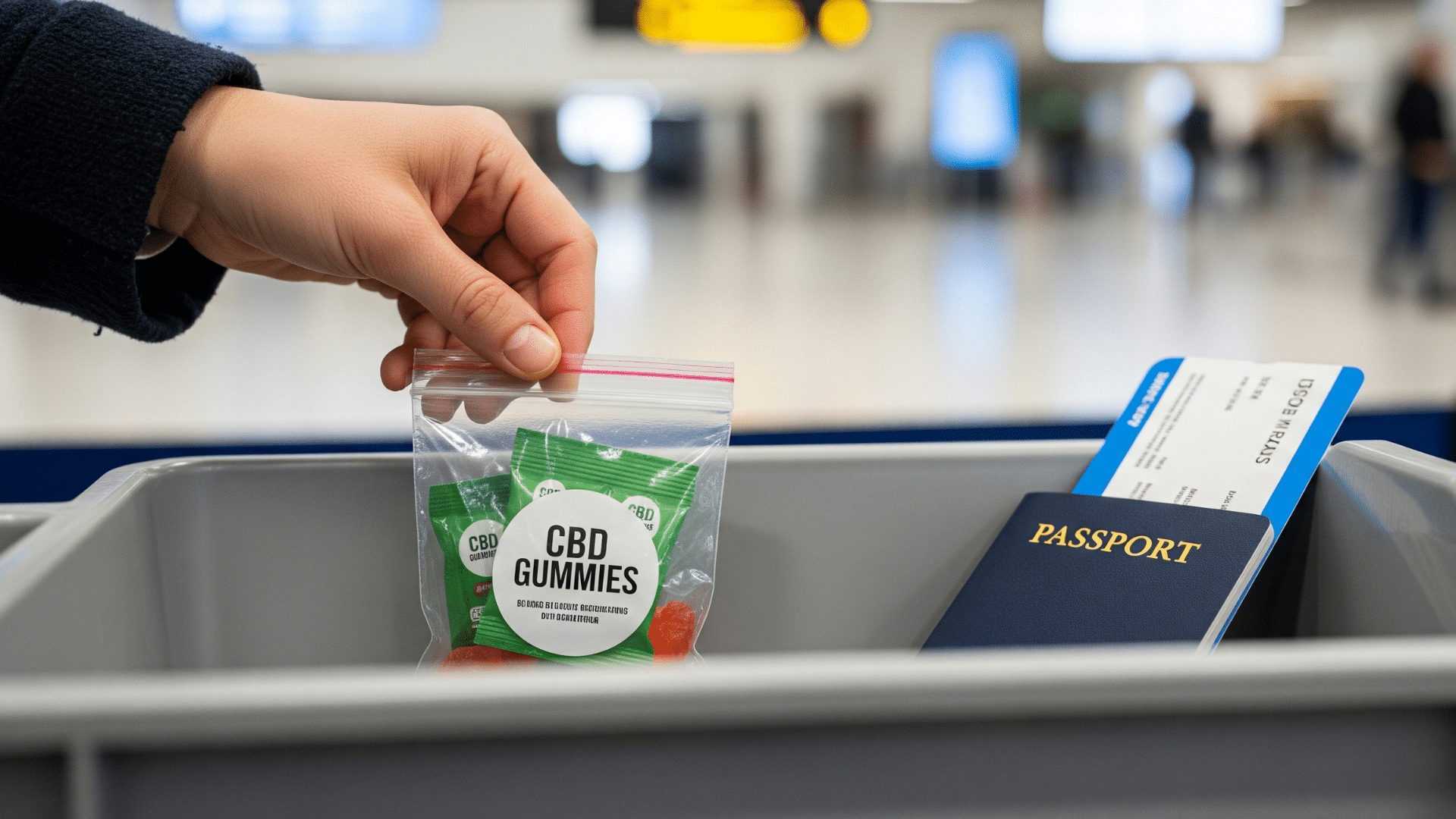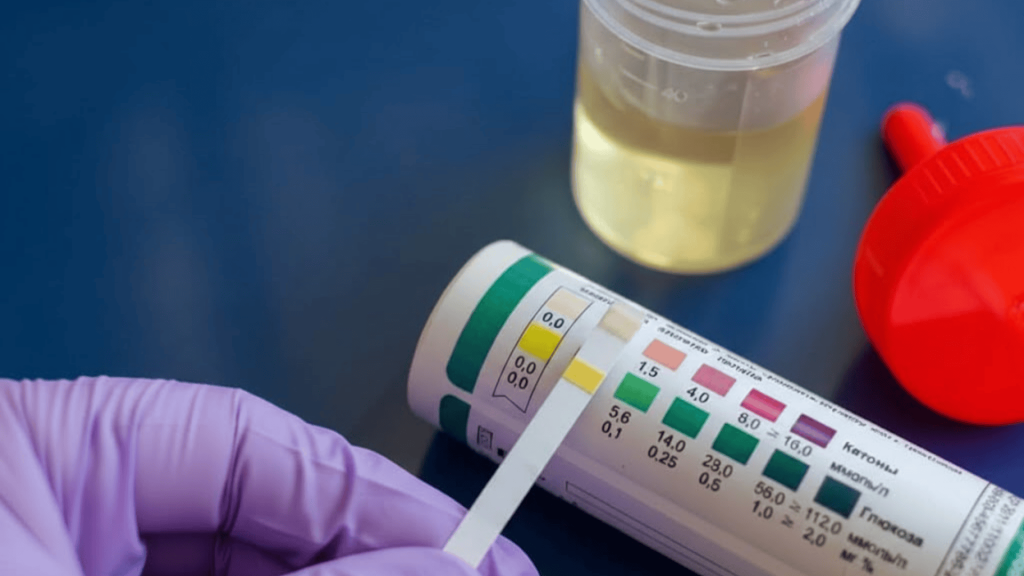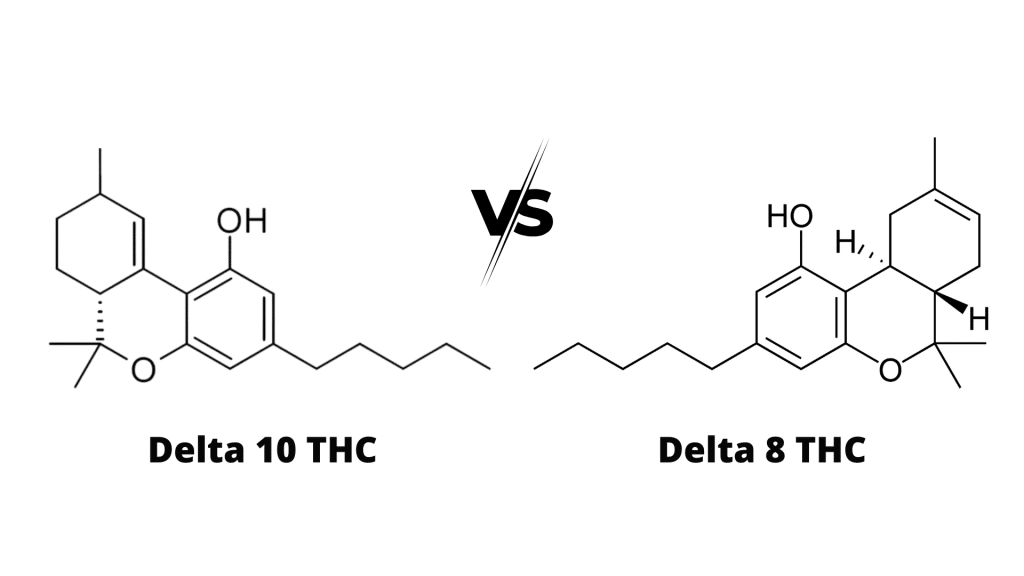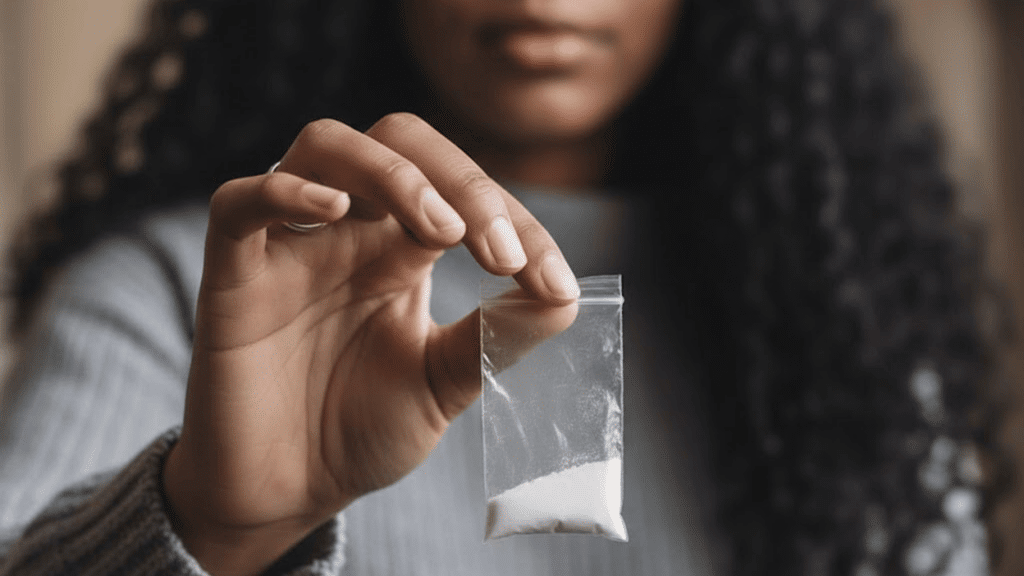If you’re thinking about packing CBD gummies for your trip, I know how confusing the rules can feel. You may use them for calm or better sleep, but carrying them through airports isn’t as simple as packing snacks.
Each country has different laws, and what’s fine in one place could create serious problems in another.
In this article, I’ll answer your main question, Can you travel with CBD gummies internationally, and walk you through the laws, TSA rules, product risks, and safer alternatives. My goal is to provide you with clear answers, allowing you to travel with confidence.
Disclaimer: This content is for informational purposes only and does not replace legal advice. CBD laws change often and vary by location. Always confirm regulations with TSA, FDA, or local authorities before traveling with CBD products.
Can You Travel With CBD Gummies on International Trips?
Traveling with CBD gummies is complicated, confusing, and often unpredictable.
The short answer is no, traveling internationally with CBD gummies is not recommended, even if CBD seems legal at your destination.
Regulations differ from country to country, and in some places, CBD is treated the same as marijuana, which can lead to severe penalties, including fines or even prison.
Within the United States, hemp-derived CBD products that contain less than 0.3% THC are generally allowed on domestic flights under TSA guidelines.
Still, it’s essential to follow airline rules, carry products in their original packaging, and keep relevant documentation handy. Once you travel abroad, the legal landscape changes significantly. Some regions are more tolerant, while others have zero-tolerance policies.
At-a-glance risk scale:
- Low Risk: U.S. domestic flights (hemp-derived CBD
- Medium Risk: Europe (some countries permit, others restrict; THC limits differ)
- High Risk: Asia & Middle East (strict bans, severe punishments)
Why CBD Gummies are Risky When Traveling
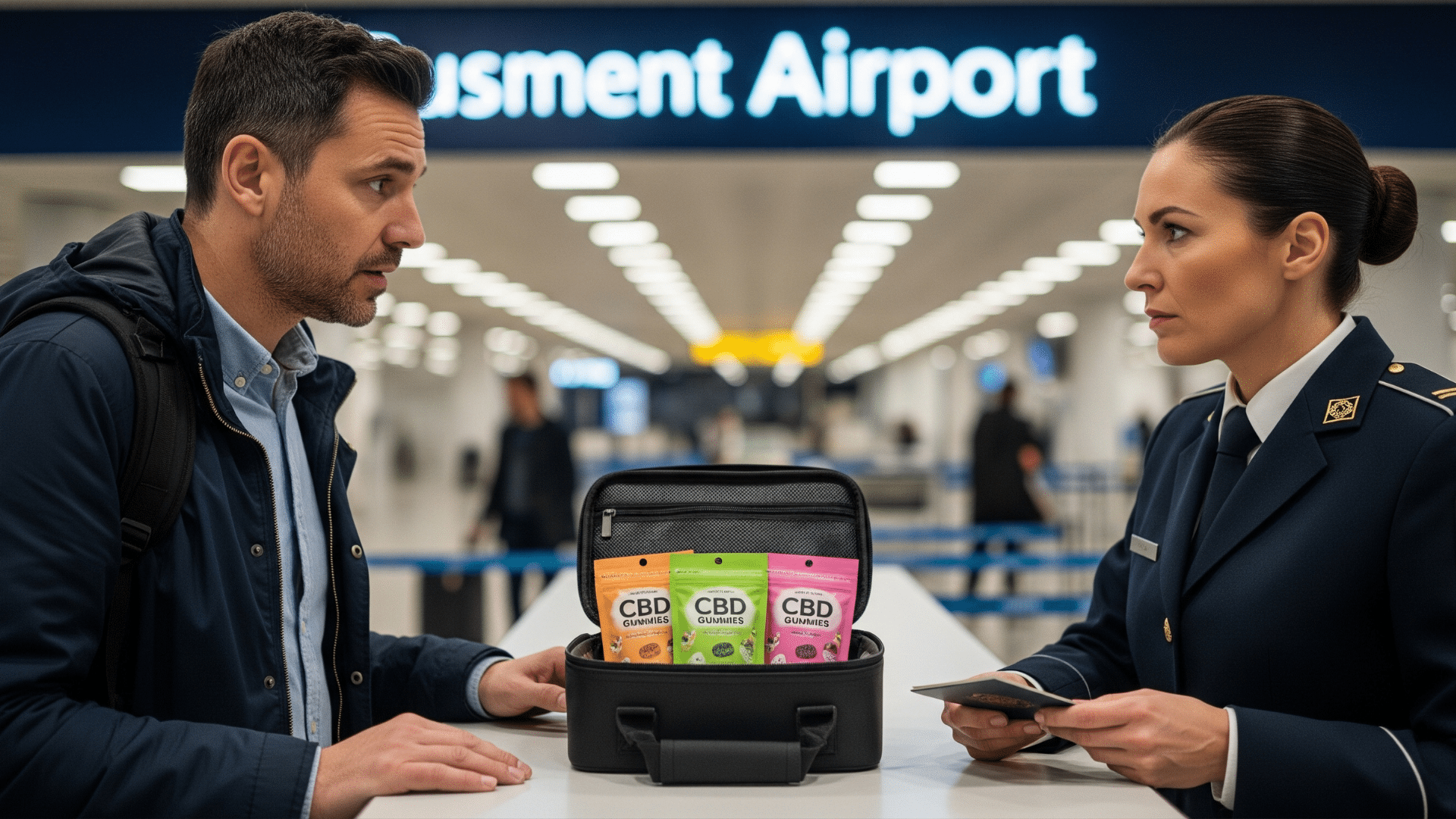
CBD gummies raise unique risks because they are edibles, which often draw more attention from airport security and customs than capsules or creams.
Another major issue is THC confusion. While hemp-derived CBD is legal in some places, not all countries distinguish between hemp and marijuana. This lack of clarity has led to severe penalties abroad.
For example, a British traveler in the UAE received a 10-year sentence, U.S. athlete Brittney Griner was jailed in Russia, and China classifies CBD as a dangerous drug. In strict regions, carrying gummies could even be treated as drug trafficking.
Global Legal Comparison: Where CBD is Allowed or Banned
CBD rules differ worldwide, and what’s safe in one country may be illegal in another. Always check before traveling.
| Region | Legal Status | THC Limit | Notes |
|---|---|---|---|
| USA | Federally legal if hemp-derived | 0.3% | State laws differ (Idaho, Nebraska are stricter) |
| Canada | Legal domestically | 0.3% | Illegal to carry across borders |
| Mexico | Legal hemp-derived CBD | 0.1–0.3% | Safer than most |
| UK | Legal | 1 mg/product | Keep in original packaging |
| EU | Mostly legal | 0.2% | Stricter in Sweden, Slovakia, and Hungary |
| Switzerland | Legal | 1% | Most tolerant |
| Asia | Mostly illegal | 0% | China, Singapore, and Japan are strict |
| Middle East | Illegal | 0% | UAE zero tolerance, severe jail terms |
| Australia | Prescription only | 0% no license | Strict medical rules |
| NZ | Prescription only | 0% no license | Import tightly controlled |
| South America | Mixed | Varies | Brazil, Uruguay are more tolerant |
Laws shift often, so confirm rules for every stop, including layovers. Relying on outdated info can lead to serious consequences.
U.S. by State
- Idaho: Only CBD isolate with 0% THC is legal.
- Nebraska: Legal status is unclear; enforcement is inconsistent.
- South Dakota: Hemp-derived CBD legal, marijuana-derived CBD banned.
- Texas & Iowa: Legal, but strict packaging and labeling requirements apply.
Regional Examples
- Europe: The UK permits CBD with up to 1 mg THC per product, while Sweden bans most CBD entirely. Enforcement differs widely, even within the EU.
- Asia: Japan allows only CBD isolate (0% THC). Thailand has eased cannabis rules but still enforces strict airport checks.
- Middle East: The UAE enforces zero tolerance. Even trace CBD can lead to lengthy prison sentences.
- Australia & New Zealand: Both require a doctor’s prescription. Importing CBD without a license is tightly controlled and risky.
TSA Rules for U.S. Air Travel With CBD
Flying with CBD inside the United States is safer than international travel, but you still must follow TSA guidelines carefully.
- Rule 1: TSA allows hemp-derived CBD products containing less than 0.3% THC under federal law for domestic flights.
- Rule 2: You may carry CBD in both your carry-on bag and checked luggage, provided it meets the federal requirements.
- Rule 3: For oils or tinctures, follow TSA’s 3-1-1 liquid rule, containers under 100 ml inside a clear quart bag.
- Rule 4: TSA officers may still confiscate products since their job is security, not confirming cannabis legality or THC levels.
- Rule 5: Always carry documentation like a Certificate of Analysis, prescription if applicable, and keep items sealed in original packaging.
Customs Declaration and Screening: What to Expect
When traveling internationally, customs officers may require you to declare CBD gummies upon arrival. Failing to declare them can lead to fines, delays, or even legal action, depending on the country’s rules.
Expect security to use X-ray scans, bag checks, or even swab tests to verify what you’re carrying. Some officers may also ask direct questions about the product.
Always be honest, carry documentation like a Certificate of Analysis, and follow local regulations to reduce risks.
CBD Product Risk Levels: Gummies vs Oils, Vapes, Topicals, and More
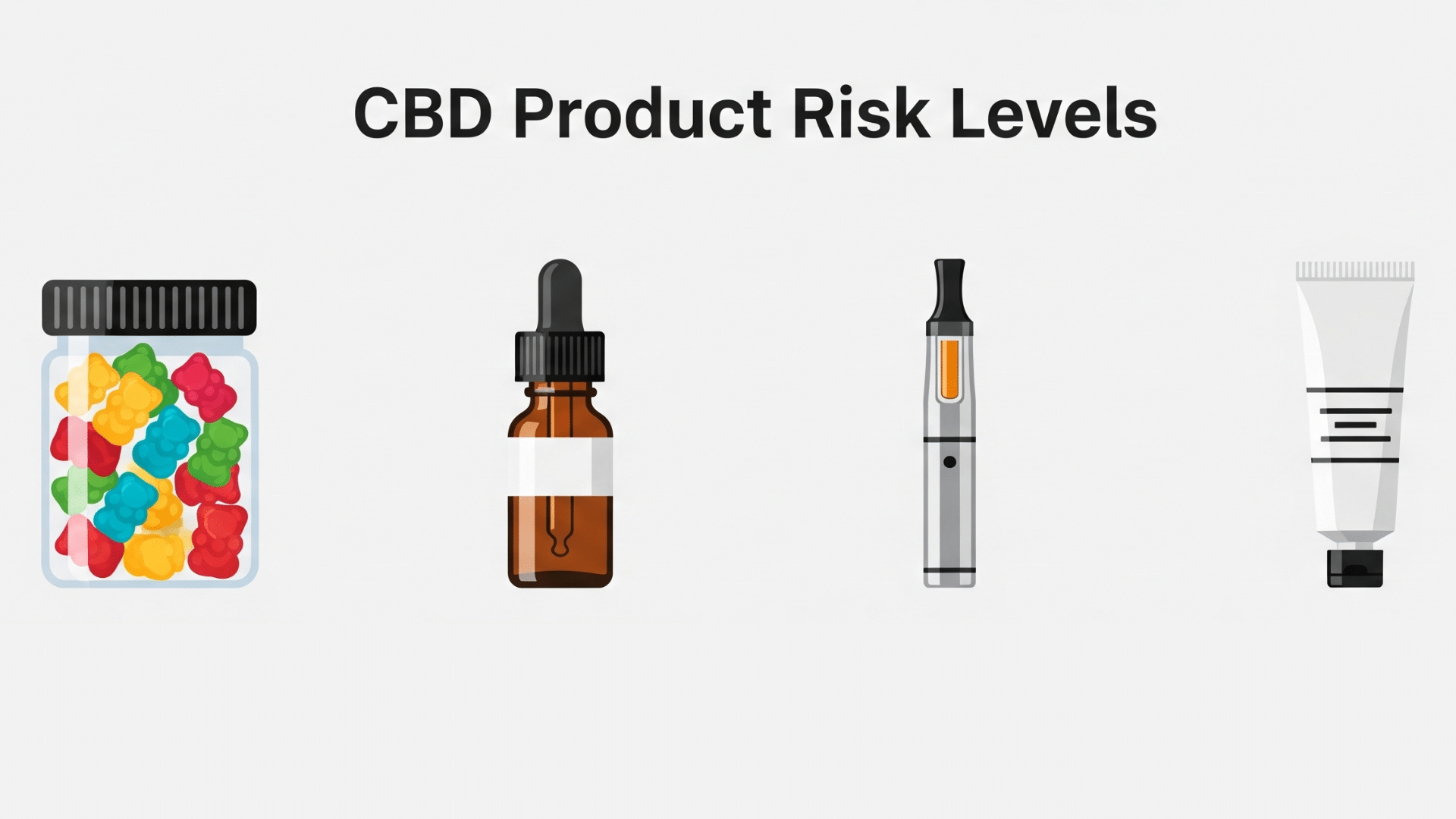
Not all CBD products carry the same level of risk when traveling. Some are more discreet, while others attract unwanted attention.
Not all CBD products are treated the same when traveling. Some forms are more discreet, while others increase the chance of problems at security or customs.
| Product Type | Risk Level | Reason |
|---|---|---|
| Gummies | Medium | Edible form → often raises red flags with customs and border officials. |
| Oils/Tinctures | Medium | Liquid → subject to TSA’s 100 ml rule, more likely to be inspected. |
| Vapes | High | Prohibited on planes; high likelihood of confiscation. |
| Topicals (creams) | Low | External use → generally tolerated and less suspicious. |
| Capsules | Medium | Easier to explain than gummies but still ingestible, may draw attention. |
| Beverages/Chocolates | Medium–High | Liquids or unusual edibles → often restricted, attract closer scrutiny. |
Best option: If you must travel with CBD, choose THC-free broad spectrum or isolate in original packaging with documentation.
Traveler’s Checklist for Carrying CBD Gummies
Use this simple checklist to lower risks and avoid common mistakes when traveling with CBD gummies.
- Research laws for departure, layover, and destination countries.
- Contact your airline about policies before packing.
- Choose THC-free products (broad spectrum or isolate).
- Carry only small amounts needed for the trip.
- Keep original packaging, Certificate of Analysis, and receipt.
- Store gummies in a carry-on for easier inspection.
- Avoid homemade or unlabeled edibles.
- Print a copy of TSA’s cannabis policy for domestic flights.
What To Do If Stopped or Questioned
If security or customs officials stop you while carrying CBD gummies, the key is to remain calm. Don’t argue or escalate the situation, as this may worsen the outcome. Instead, cooperate fully with officers and answer questions respectfully.
Present any documentation you have, such as a Certificate of Analysis, purchase receipt, or prescription, to show legitimacy. If they decide to take the product, accept it without protest.
When traveling abroad, immediately contact your embassy or consulate for support if legal issues arise.
Safer Alternatives to Traveling With CBD Gummies
If traveling with CBD gummies feels too risky, consider safer options that can help you avoid legal trouble.
- Alternative 1: Buy CBD locally at your destination if it’s legally sold and properly regulated.
- Alternative 2: Use non-CBD sleep or stress aids like melatonin, magnesium, or chamomile for relaxation during flights.
- Alternative 3: Try CBD-free supplements designed for travel comfort, offering calming effects without the risks of hemp-based products.
- Alternative 4: Take a short break from CBD if visiting countries with strict cannabis laws and zero-tolerance policies.
Conclusion
By now, you’ve seen why the answer to the question ‘Can you travel with CBD gummies internationally?’ is usually no. Even though they may help with stress or sleep, the rules outside the United States are unclear and often strict.
I understand why you’d want to bring them, but the risks, fines, delays, or worse, outweigh the benefits. What you can do instead is plan ahead, check local laws, and consider safer alternatives.
If you prepare now, your trip will be smoother and less stressful. For more practical advice to guide your travels, I encourage you to check out my other blogs.

